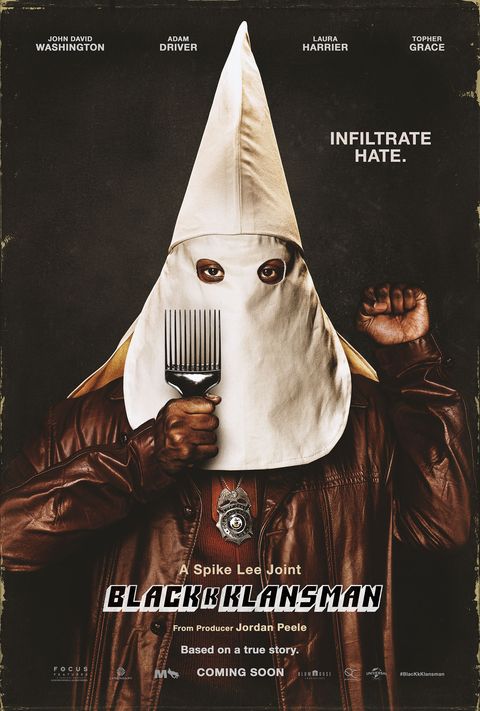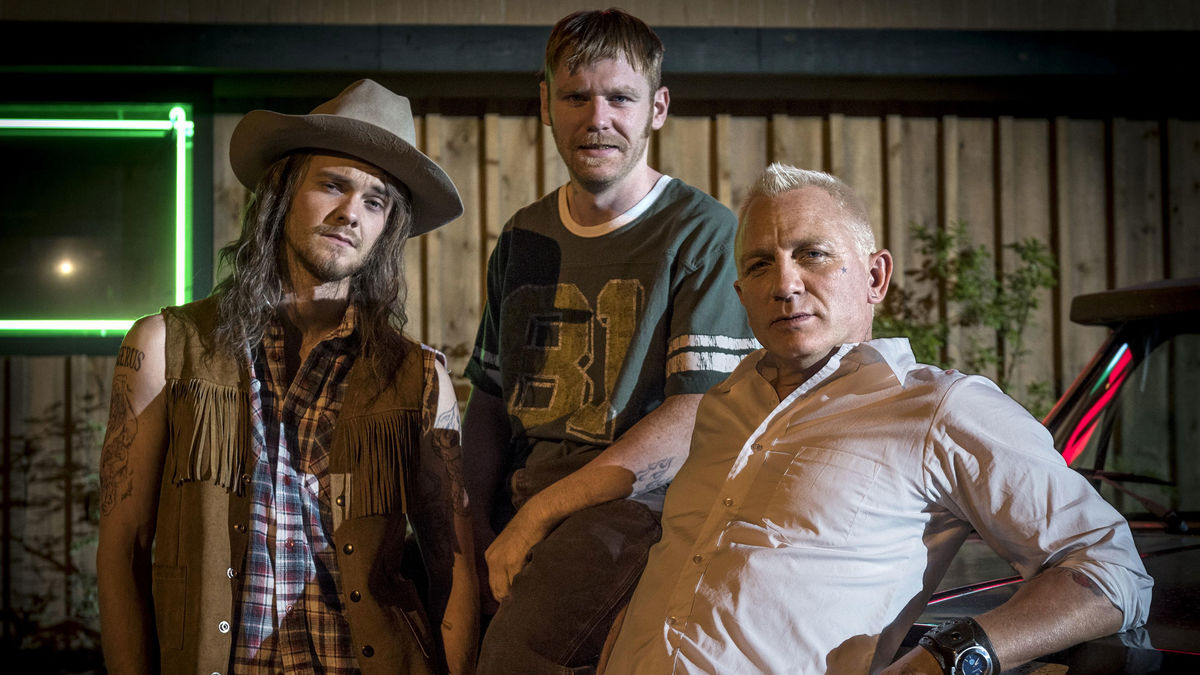Director: Spike Lee
Well-done and compelling movie on an ever-more relevant and important topic, though maybe a movie that got just a tad more positive acclaim than maybe it earned.
BlackKklansman is a dramatic adaptation of the incredible, real-life story of Colorado Springs County, Colorado, police detective Ron Stallworth (John David Washington) - the first black member of the force, who joined in the late 1970s. Though initially relegated to the drudgery of clerical work, where he is subject to some nasty racism at the hands of a few colleagues, Stallworth soon proves his merit in an undercover operation to gather intel on a Black Student Union (BSU) meeting in the area, where he was to gauge the tone of the room in response to a speech by a prominent civil right leader. After a promotion, he conceives the idea to gather information on local white supremacist groups, namely the Ku Klux Klan. On a whim, he calls a phone number (actually listed in the phone book), puts on a southern accent, and poses as someone interested in getting involved with the KKK. The receiver of the call buys Stallworth's story and invited him to a meeting. The obvious problem is that Stallworth is unmistakably a black man, so he convinces his captain to bring a couple of partners into the operation. Their captain taps two veteran cops, Flip Zimmerman (Adam Driver) and Jimmy Creek (Michael Buscemi) to work with Stallworth. Flip assumes the physical role of Ron, and he steadily embeds himself within the local cell of the KKK. Meanwhile, the real Ron continues his correspondence over the phone, soon having long talks with none other than David Duke, the Grand Wizard of the Klan, based in Louisiana. Ron and Flip eventually learn of the Klan's plan to make a violent statement by bombing a local Black Students' Union meeting. Ron and Flip have to act quickly to prevent this, all while Ron has been placed on guard duty for none other than David Duke, who is in town to visit the local KKK chapter.
This is a good movie whose subject matter and import are important enough to outweigh a few of the movie's minor shortcomings in terms of narrative or artistic choices. Though the real Ron Stallworth's story unfolded over 40 years ago, this 2018 film still feels all-too relevant, given the massive Black Lives Matter protests which have erupted in the wake of the brutal killing of George Floyd at the hands of police officers. This has touched off the nasty reminder that virulent racism is still all-too present in this country, and it was even more so back in the early 1970s. While BlackKklansman reportedly takes certain liberties with the story, many of the elements regarding the KKK's racist views and plans to kick-start a race war were all too real. This was still a time and place where the KKK was comfortable enough holding a sizable conference at a hotel, where Klan organizer and leader David Duke railed about the superiority of the white race, feeling confident that such meetings would help swell the Klan's numbers to those of its heyday in the early 20th century. Detective Ron Stallworth not only had to deal with these in a professional manner, but he also had to maintain a level head in the face of open racism in his workplace. The messages about racism are not always subtle in the movie - a hallmark of most Spike Lee films - but their importance can't be refuted. Perhaps the most powerful moments are when Harry Belafonte, himself a longtime civil rights activist, plays an older activist recounting
There are plenty of production merits to the film, as well. The acting is great by everyone involved, most obviously John David Washington and Adam Driver. The 1970s sets and costumes are all on point, brought out even more by the sharp cinematography. In short, the film is very pleasing to take in, visually, and it should come as no surprise that the soundtrack has plenty of fun late-1970s disco and R&B jams to give a fun vibe during appropriate scenes. These help to accentuate the much tenser scenes when Zimmerman is directly inside the secret meetings and safehouse of the KKK.
BlackKklansman earned a ton of critical acclaim upon its release in 2018, being nominated for most of the biggest awards for film. For my part, I thought it was a very good movie, but I don't quite put it on par with other worthy Oscar winners or nominees (though 2018 wasn't an especially strong year, so it made sense for that group of nominees). While the story is undoubtedly fascinating, relevant, and told skillfully, there wasn't anything that I found to be especially novel about the movie, outside of Stallworth's story. It's worth seeing, for sure, but I would warn most new viewers not to expect some mind-blowing experience about race relations.
Well-done and compelling movie on an ever-more relevant and important topic, though maybe a movie that got just a tad more positive acclaim than maybe it earned.
BlackKklansman is a dramatic adaptation of the incredible, real-life story of Colorado Springs County, Colorado, police detective Ron Stallworth (John David Washington) - the first black member of the force, who joined in the late 1970s. Though initially relegated to the drudgery of clerical work, where he is subject to some nasty racism at the hands of a few colleagues, Stallworth soon proves his merit in an undercover operation to gather intel on a Black Student Union (BSU) meeting in the area, where he was to gauge the tone of the room in response to a speech by a prominent civil right leader. After a promotion, he conceives the idea to gather information on local white supremacist groups, namely the Ku Klux Klan. On a whim, he calls a phone number (actually listed in the phone book), puts on a southern accent, and poses as someone interested in getting involved with the KKK. The receiver of the call buys Stallworth's story and invited him to a meeting. The obvious problem is that Stallworth is unmistakably a black man, so he convinces his captain to bring a couple of partners into the operation. Their captain taps two veteran cops, Flip Zimmerman (Adam Driver) and Jimmy Creek (Michael Buscemi) to work with Stallworth. Flip assumes the physical role of Ron, and he steadily embeds himself within the local cell of the KKK. Meanwhile, the real Ron continues his correspondence over the phone, soon having long talks with none other than David Duke, the Grand Wizard of the Klan, based in Louisiana. Ron and Flip eventually learn of the Klan's plan to make a violent statement by bombing a local Black Students' Union meeting. Ron and Flip have to act quickly to prevent this, all while Ron has been placed on guard duty for none other than David Duke, who is in town to visit the local KKK chapter.
This is a good movie whose subject matter and import are important enough to outweigh a few of the movie's minor shortcomings in terms of narrative or artistic choices. Though the real Ron Stallworth's story unfolded over 40 years ago, this 2018 film still feels all-too relevant, given the massive Black Lives Matter protests which have erupted in the wake of the brutal killing of George Floyd at the hands of police officers. This has touched off the nasty reminder that virulent racism is still all-too present in this country, and it was even more so back in the early 1970s. While BlackKklansman reportedly takes certain liberties with the story, many of the elements regarding the KKK's racist views and plans to kick-start a race war were all too real. This was still a time and place where the KKK was comfortable enough holding a sizable conference at a hotel, where Klan organizer and leader David Duke railed about the superiority of the white race, feeling confident that such meetings would help swell the Klan's numbers to those of its heyday in the early 20th century. Detective Ron Stallworth not only had to deal with these in a professional manner, but he also had to maintain a level head in the face of open racism in his workplace. The messages about racism are not always subtle in the movie - a hallmark of most Spike Lee films - but their importance can't be refuted. Perhaps the most powerful moments are when Harry Belafonte, himself a longtime civil rights activist, plays an older activist recounting
There are plenty of production merits to the film, as well. The acting is great by everyone involved, most obviously John David Washington and Adam Driver. The 1970s sets and costumes are all on point, brought out even more by the sharp cinematography. In short, the film is very pleasing to take in, visually, and it should come as no surprise that the soundtrack has plenty of fun late-1970s disco and R&B jams to give a fun vibe during appropriate scenes. These help to accentuate the much tenser scenes when Zimmerman is directly inside the secret meetings and safehouse of the KKK.
BlackKklansman earned a ton of critical acclaim upon its release in 2018, being nominated for most of the biggest awards for film. For my part, I thought it was a very good movie, but I don't quite put it on par with other worthy Oscar winners or nominees (though 2018 wasn't an especially strong year, so it made sense for that group of nominees). While the story is undoubtedly fascinating, relevant, and told skillfully, there wasn't anything that I found to be especially novel about the movie, outside of Stallworth's story. It's worth seeing, for sure, but I would warn most new viewers not to expect some mind-blowing experience about race relations.





